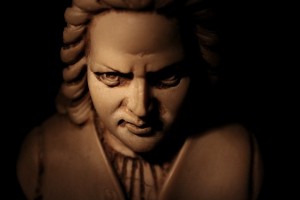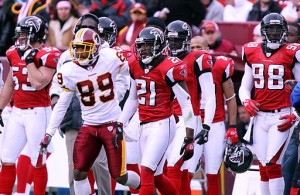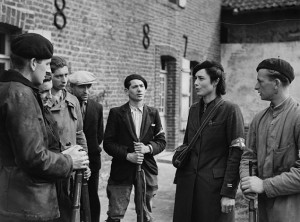 Alex Ross, music critic for The New Yorker has written a fascinating piece on Bach’s theology. He says that while much research of the past tried to look at Bach in purely secular terms, today’s scholarship is attempting to unpack the musical impact of his Lutheranism.
Alex Ross, music critic for The New Yorker has written a fascinating piece on Bach’s theology. He says that while much research of the past tried to look at Bach in purely secular terms, today’s scholarship is attempting to unpack the musical impact of his Lutheranism.
Ross reviews several recent books on the subject, including one that tries to read into Bach’s music elements of anti-semitism, as if that is what Lutheranism is all about. (Despite Luther’s senile ravings at the end of his life, Lutheran theology at the very least removed the stigma that Jews are to be blamed as Christ-killers–what the book in question is looking for in Bach’s Passions–since Lutheran theology sees Christ’s death as the result of all human sin, making possible their redemption.) In reading the review of the books, which touches on the struggles and spiritual dynamism reflected in Bach’s music, I was struck by how little outsiders know about the distinctive, unique elements of Lutheran spirituality, such as the contrast between Cross and Glory, and the spiritual desolation known as Anfechtung. These would be highly relevant to Bach’s music, accounting for some of what these scholars otherwise struggle to explain.
But I love Ross’s close readings of Bach’s music, particularly, St. John’s Passion, in which he shows the Biblical and theological meaning of the musical structures the composer employs. I love this quotation of one the authors: “Marissen identifies himself as an agnostic, but adds that in the vicinity of Bach’s music he will never be a “comfortable agnostic.” I love that so much of this research draws on the copy of Bach’s annotated Bible held by Concordia Seminary in St. Louis, which Ross discusses. And I love the overall question asked by this article and by the books themselves: How is it that music based on such archaic theological ideas can connect so profoundly with people in our time? (I would answer that Bach is evidence that Lutheranism itself, properly understood, can connect profoundly with people in our time.)
From Alex Ross, Bach’s Holy Dread – The New Yorker:
“Bach & God” (Oxford) is the splendid title of a new book by Michael Marissen, a professor emeritus at Swarthmore College. It brings to mind two approximately equal figures engaged in a complicated dialogue, like Jefferson and Adams, or Siskel and Ebert. The book is one of a number of recent attempts to grapple with Bach’s religiosity. Others are Gardiner’s “Bach: Music in the Castle of Heaven” (Knopf); Eric Chafe’s “J. S. Bach’s Johannine Theology” (Oxford); and John Butt’s “Bach’s Dialogue with Modernity: Perspectives on the Passions” (Cambridge). All ask, in different ways, how we should approach works whose devotional intensity is alien to most modern listeners. Marissen identifies himself as an agnostic, but adds that in the vicinity of Bach’s music he will never be a “comfortable agnostic.”
Previous Bach scholarship tended to take a more secular tack. Many of us grew up with an Enlightenment Bach, a nondenominational divinity of mathematical radiance. Glenn Gould’s commentary on the “Goldberg Variations” spoke of a “fundamental coordinating intelligence.” One German scholar went so far as to question the sincerity of Bach’s religious convictions. But the historically informed performance movement, in trying to replicate the conditions in which Bach’s works were first played, helped to restore awareness of his firm theological grounding. Recorded surveys of the two hundred or so sacred cantatas, including Gardiner’s epic undertaking in 1999 and 2000, have brought Bach’s spirituality to the forefront. To what extent does he faithfully transmit Lutheran doctrine? What did he privately believe? Marissen also confronts an issue that many prefer to avoid: do Bach’s Passions project anti-Semitism?. . . .
The book that perhaps reveals more of Bach than any other can be found at the Concordia Seminary, in St. Louis. By chance, that organization came into possession of Bach’s copy of Abraham Calov’s three-volume edition of the Bible, which contains Luther’s translation of the Bible alongside commentaries by Luther and Calov. Bach made notes in it and, in 1733, signed his name on the title page of each volume. The marginalia establish the fervor of his belief: no Sunday Christian could have made such acute observations. Bach singles out passages describing music as a vessel of divinity: in one note, he observes that music was “especially ordered by God’s spirit through David,” and in another he writes, “With devotional music, God is always present in his grace.” The annotations also seem to reveal some soul-searching. This passage is marked as important, and is partly underlined: “As far as your person is concerned, you must not get angry with anyone regardless of the injury he may have done to you. But, where your office requires it, there you must get angry.” One can picture Bach struggling to determine whether his “almost continual vexation” stemmed from his person or his office—from vanity or duty.
Yes, Bach believed in God. What is harder to pin down is how he positioned himself among the theological trends of the time. The Pietist movement, which arose in the late seventeenth century, aimed at reinvigorating an orthodox Lutheran establishment that, in its view, had become too rigid. Pietists urged a renewal of personal devotion and a less combative attitude toward rival religious systems, including Judaism. Bach made passing contact with Pietist figures and themes, though he remained aligned with the orthodox wing—not least because Pietists held that music had too prominent a role in church services.
Illustration by Isabella Quintana, “Bach Musician,” Pixabay, CC0, Public Domain.





